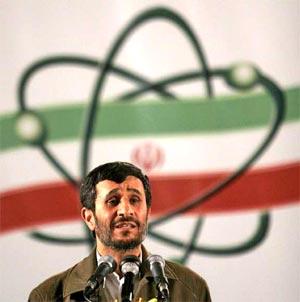Weapons of mass destruction. Speculation and fear. Threat to the United States. Increasing tensions.
No, this is not Iraq circa 2003, but its Middle Eastern neighbor: Iran.
On Nov. 8, the International Atomic Energy Agency issued a report stating that Iran, claiming only to want nuclear-generated electricity, has taken steps toward developing nuclear weapons. The report has created fear and speculation among many Western nations.
However, after the long-lasting Iraq war, Americans are less likely to support another war over a nuclear threat. Robert Duncan, visiting assistant professor of political science, spoke about the potential for a U.S. military attack against Iran.
“Not going to happen,” said Duncan. “No way. Nada. Zip. Zero. Zilch. No chance. The Israelis? Yes, maybe.”
Israel distrusts Iran’s motives. This distrust and the IAEA’s recent report have resulted in Israeli and American efforts to halt Iran’s program through economic sanctions. If the sanctions fail, Israel may pursue military action, said The New York Times.
“Right now, it seems like Israel or the United States is going to attack Iran for their potential to develop nuclear weapons, and that’s not a legitimate reason,” said Joe Cole, visiting assistant professor of philosophy. “It’s not legitimate unless they actually have nuclear weapons and are planning to use them against someone. Only then is there a just cause for war.”
Under the principles of Just War Theory, there must be a legitimate cause for war, such as a nation’s self-defense against an immediate attack, a humanitarian crisis like genocide or starvation that shocks our moral conscience or the support of a legitimate revolutionary or independence movement.
“The rhetoric of, ‘They have nuclear weapons,’ is used to scare the public,” said Cole. “But that doesn’t pass muster in international law. That’s where double standards come in. We have nuclear weapons; we found out Israel has them, and they haven’t signed the Nuclear Non-Proliferation Treaty. … If we have our own, it’s unfair for us to tell other countries that they can’t have nuclear weapons.”
Senior Claire Massagee, political science and information technology major, detailed the politics of nuclear weapon proliferation.
“I do not feel happy about the creation of any more nuclear weapons,” said Massagee in an email interview. “However, I understand the motivations for wanting a nuclear weapon of one’s own. Some countries feel threatened by other nuclear powers, or perhaps they want extra leverage on the world stage.”
However, several countries want to prevent Iran from gaining that leverage.
According to The New York Times, the U.S., Britain and Canada have implemented economic sanctions against Iran to weaken their potential for further nuclear development. Historically, however, issuing sanctions carries severe consequences.
“Sanctions against Iraq in the 90s — after we pushed the Iraqis out of Kuwait — put misery and suffering on the people,” said Cole. “It’s estimated that one million people died — half of them children — as a result of the sanctions and the bombings of hospitals, roads, and water-treatment facilities.”
Governments opposed to Iran’s nuclear program have supported the economic sanctions. The U.S. fears that sanctions could drive up the price of oil, increasing costs for U.S. consumers, netting eventual profits for oil-rich Iran. Because of this, Iran has not yet been placed under crippling sanctions.
However, there have been other setbacks to Iran’s nuclear program.
One example was sabotage in the form of the Stuxnet computer virus in 2010, likely created by Israel and/or the U.S. The virus disrupted Iran’s nuclear program but did not stop it completely. Massagee, working on a thesis project on Stuxnet, explained the worm and the potential for similar strategies.
“Similar forms of sabotage seem unlikely in the near future,” said Massagee. “Stuxnet had many different versions, but once it was discovered, Iran likely took the necessary steps to eradicate it from the system to prevent further infection. And Iran is likely much more wary of such an attack. This worm took 10,000 man-hours to create, according to folks at Microsoft. It is unlikely an even more advanced and sneaky worm could have yet been created.”
The Stuxnet worm only set back Iran’s efforts. Iran will continue to develop their nuclear program, even amid increasing pressure from other nations.
“It’s a cosmic conundrum,” said Duncan. “They are on the path to developing nuclear weapons, and they’re going to do that come hell or high water. As long as it’s possible, they will keep pushing to develop them. That’s the thing about (Iranian President Mahmoud) Ahmadinejad — he doesn’t care what the international community thinks of him; he’s immune to that pressure.”

